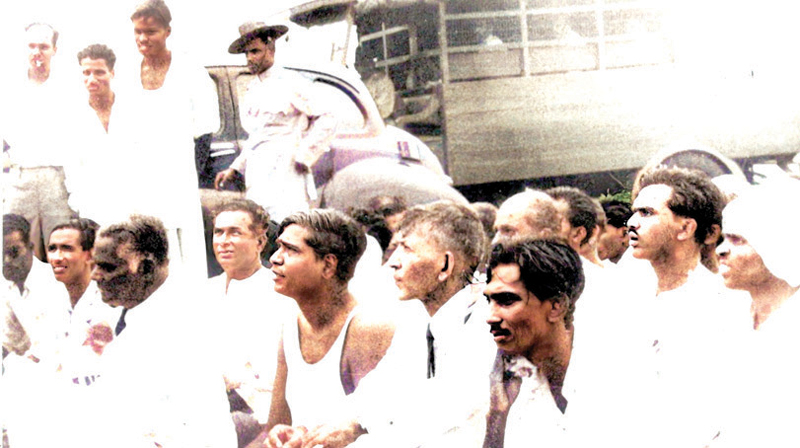 “…Do we want an independent Ceylon or two bleeding halves of Ceylon which can be gobbled up by every ravaging imperialist monster that may happen to range the Indian Ocean? These are issues that in fact we have been discussing under the form and appearance of the language issue…One language, two nations; Two languages, one Nation…”
“…Do we want an independent Ceylon or two bleeding halves of Ceylon which can be gobbled up by every ravaging imperialist monster that may happen to range the Indian Ocean? These are issues that in fact we have been discussing under the form and appearance of the language issue…One language, two nations; Two languages, one Nation…”
These famous words of wisdom by Lanka Sama Samaja Party stalwart Dr. Colvin R. de Silva, spoken during the 1956 debate on the Official Languages Bill, widely known as the “Sinhala Only Bill,” still echo through the decades like a warning unheeded.
Despite our rich cultural mosaic, which includes Sinhala, Tamil, Muslim, Burgher, and Malay communities, language has often been used not as a bridge but as a weapon. Instead of celebrating our diversity, we have spent nearly half of our post-independence years fighting and blaming one another, stalling the country’s progress and reversing the few socio-economic gains we had made, while other nations advanced far beyond us.
We have stumbled into decades of unrest, driven not by differences, but by the refusal to understand and respect those differences. Ethnic and religious disharmony is often fuelled by our inability to see one another as equals, as fellow human beings.
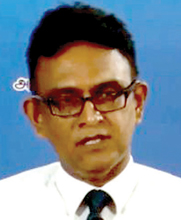
Official Languages Department Commissioner General Thilak Nandana Hettiarachchi
Time and again, our self-serving leaders have used division as a means to grab power and cling to it. They lacked the wisdom to use the authority and power granted by the people for the common good. The people, who were misled, manipulated, and distracted, also unfortunately lacked the awareness to recognise true leaders from power-hungry opportunists.
History at a glance
Sri Lanka is often described as a trilingual country. Unlike neighbouring India, which has over 120 major languages with 22 official languages, or China, which is said to have some 300 living languages, Sri Lanka is primarily home to Sinhala-, Tamil- and English-speaking people. Of course, the Veddha community and the deaf community use their own indigenous languages, and there is a small population that speaks Sri Lankan Malay Creole, also known as bahasa Melayu, which has uniquely evolved through contact with Sinhala and Tamil. Local Malay is considered endangered due to its declining number of speakers.
Under the colonial rule, English was the language of governance and administration, denying the vast majority of the population the right to use their mother tongue in official matters. The Official Languages Act of 1956 was meant to reverse this language-based discrimination, but it created more harm than good by making Sinhala the only official language, marginalising Tamil speakers. Proficiency in Sinhala became a prerequisite for entering and getting promotions in the public service, creating language barriers for many non-Sinhala speakers, who were fluent in Tamil, English or both, in achieving their ambitions.
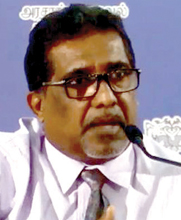
Official Languages Commission Chairman Nimal Ranawaka
The contestation over language rights led to ethnic tensions, which eventually escalated into physical violence, leaving dark chapters in our history. The 13th Amendment to the Constitution, introduced in 1987, settled the matter by recognising both Sinhala and Tamil as official languages with English as a “link language.” To date, this remains our core language policy. Yet, even after 77 years of independence, we continue to struggle to achieve true language parity.
Public servants
“Securing citizens’ language rights means allowing them to get their work done at a public institution, receive education, or engage in any form of communication in their mother tongue,” Official Languages Department Commissioner General Thilak Nandana Hettiarachchi said.
In 2007, through the Public Administration Circulars and Regulations on Second Language Competency for Public Officers, the Government made it compulsory for public officers, including principals, doctors, judicial officers and police officers, to become proficient in both Sinhala and Tamil within five years of recruitment, so that they can carry out their duties in either language. However, 18 years down the line, how many of our public servants have a basic knowledge of both languages, let alone fluency?
“Passing an examination alone will not make one competent in any language. We forget it when it is not used. Practice is the key,” Official Languages Commission Chairman Nimal Ranawaka said.
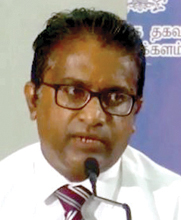
National Institute of Language Education and Training Director General Shaminda Mahalekam
It is truly frustrating and often embarrassing when you call a government hotline, but the officer who answers cannot assist you because he or she does not understand your language. Or when you see a doctor but are unable to explain your condition in the language you are most comfortable with. Or when you go to a police station to make a complaint, only to find that there is no officer who can record it in your language. Unfortunately, these situations occur more often than we think.
Translators in demand
The Government policy is to make all forms available in Sinhala, Tamil and English, but a lack of human and physical resources has made this task challenging. It is a known fact that currently many public institutions are facing a dearth of professional translators and interpreters. The situation is not much different in many private workplaces either, where bilingual employees are often asked to take on additional responsibilities due to this shortage.
National Institute of Language Education and Training Director General Shaminda Mahalekam said that the language courses conducted for public servants have fallen short of their intended results. “Building on the 150-200-hour language course, we have now designed a 120-hour online speechcraft training program for public servants in institutions such as Customs, the Motor Traffic Department and the Pensions Department. However, public servants must be willing to learn. A language cannot be taught forcefully,” he said.
“The knowledge of a second language should be developed from school level. A Sinhala child must be able to understand what a Tamil-speaking child is saying, and vice versa.
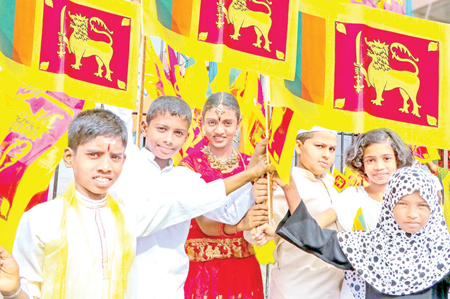 Language should be used to promote a Sri Lankan identity and build social cohesion, and not to inflame divisions,” Ranawaka added.
Language should be used to promote a Sri Lankan identity and build social cohesion, and not to inflame divisions,” Ranawaka added.
In the aftermath of an unprecedented economic crisis, caused by decades of mismanagement and corruption, and worsened by the Covid-19 pandemic, national unity matters in determining how strong and how fast our recovery will be. Language is a powerful tool in this direction.
The Report of the Lessons Learnt and Reconciliation Commission (LLRC), submitted in 2011 with recommendations for post-war reconciliation, acknowledges the importance of language rights in the reconciliation process, emphasising the need for effective implementation of relevant constitutional provisions. The report highlights the importance of ensuring access to justice in all three languages and recommends that official documents, including the LLRC report itself, be made available in Sinhala and Tamil, in addition to English.
The Official Languages Department has planned language courses for bhikkhu students, Muslim Moulavis, Hindu Kurukkals and Catholic sisters to learn Sinhala or Tamil as a second language. “Mutual understanding and respect for each others’ languages pave the way for religious harmony as well,” said the Department’s Commissioner General.
The officials were addressing a media conference at the Government Information Department last week to announce Official Languages Week from July 1 to 7, parallel to Official Languages Day, observed under the theme “Basa Vadamu-Hada Dinamu”, loosely translated as “Let’s learn languages and win hearts”. A series of activities were held throughout the week to remind the public of the power of language and how it can be used to build bridges among communities.






